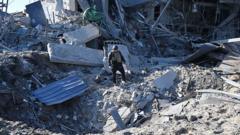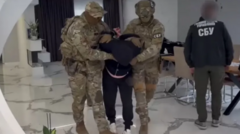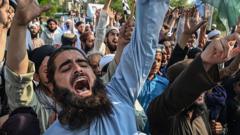As the Easter season unfolds, President Vladimir Putin has proclaimed a temporary truce for Russian troops in Ukraine, set to last for 30 hours until Sunday night. However, Ukrainian President Volodymyr Zelensky and Foreign Minister Andriy Sybiha express deep skepticism about Putin's intentions, describing his past actions as untrustworthy.
Putin Orders 'Easter Truce' Amidst Skepticism from Ukraine

Putin Orders 'Easter Truce' Amidst Skepticism from Ukraine
Russian President Putin announces a temporary ceasefire in Ukraine, but Ukrainian leaders express doubt over its sincerity.
In a surprising announcement, Putin called for a halt in military operations in Ukraine, intending to honor the Easter holiday. The ceasefire is to be observed until 22:00 BST on Sunday (00:00 Moscow time). The Russian leader warned his forces to remain vigilant for any breaches of the truce. Zelensky characterized Putin's gesture as a ploy, citing the presence of Russian drones in Ukrainian airspace just before the commencement of the ceasefire.
Further skepticism was voiced by Sybiha, who noted Ukraine had previously agreed to a 30-day ceasefire proposed by the United States, leading to ironic remarks about Putin's shortened, 30-hour declaration. He stressed, “His statements do not align with his actions,” indicating Ukraine's reluctance to take Putin's words at face value.
In a meeting during the truce announcement, Putin claimed the ceasefire was based on humanitarian grounds while simultaneously preparing Russian troops for potential provocations by Ukraine. The Russian Defense Ministry stipulated that its army would adhere to the ceasefire only if reciprocal respect was shown by Ukraine.
This is not the first occasion where a pause in fighting has been announced, as previous attempts—including a Christmas truce earlier this year—failed due to disagreements between both parties. The ongoing conflict, which began on February 24, 2022, has resulted in mass casualties, primarily among military personnel.
Meanwhile, diplomatic efforts led by the United States to mediate an end to the war seem to be losing momentum. Following a rejection of a proposal for a comprehensive ceasefire, US leaders have signaled an urgency for progress, with remarks indicating a potential withdrawal from lengthy negotiations if results are not swiftly achieved. The coming days may prove pivotal in determining the future trajectory of the conflict.
Further skepticism was voiced by Sybiha, who noted Ukraine had previously agreed to a 30-day ceasefire proposed by the United States, leading to ironic remarks about Putin's shortened, 30-hour declaration. He stressed, “His statements do not align with his actions,” indicating Ukraine's reluctance to take Putin's words at face value.
In a meeting during the truce announcement, Putin claimed the ceasefire was based on humanitarian grounds while simultaneously preparing Russian troops for potential provocations by Ukraine. The Russian Defense Ministry stipulated that its army would adhere to the ceasefire only if reciprocal respect was shown by Ukraine.
This is not the first occasion where a pause in fighting has been announced, as previous attempts—including a Christmas truce earlier this year—failed due to disagreements between both parties. The ongoing conflict, which began on February 24, 2022, has resulted in mass casualties, primarily among military personnel.
Meanwhile, diplomatic efforts led by the United States to mediate an end to the war seem to be losing momentum. Following a rejection of a proposal for a comprehensive ceasefire, US leaders have signaled an urgency for progress, with remarks indicating a potential withdrawal from lengthy negotiations if results are not swiftly achieved. The coming days may prove pivotal in determining the future trajectory of the conflict.




















